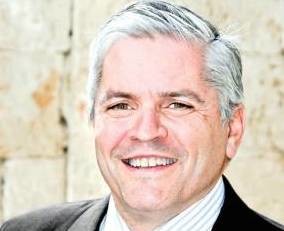Moving beyond time and place to find our place
This week we celebrate the festival of Shavuot, commemorating a moment, 3200 years ago, when we all stood together, beneath a wind-swept mountain, deep in the Sinai desert. At that moment we became one, experiencing a desire to receive and share together.
There is a legend about Moses Mendelssohn, the grandfather of the well-known German composer. He was far from handsome, with a rather short stature and a grotesque hunchback. One day he visited a merchant in Hamburg who had a lovely daughter named Frumtje. Moses fell helplessly in love with her. But Frumtje was repulsed by his misshapen appearance.
When it was time for him to leave, Moses gathered his courage and climbed the stairs to her room to take one last opportunity to speak with her. She was a vision of heavenly beauty, but caused him deep sadness by her refusal to even look at him. After several attempts at conversation, Moses shyly asked, “Do you believe marriages are made in heaven?”
“Yes,” she answered, still looking at the floor. “And do you?”
“Yes, I do,” he replied. “You see, in heaven at the birth of each boy, G-d announces which girl he will marry. When I was born, my future bride was pointed out to me. Then G-d added, ‘But your wife will be humpbacked.’ Right then and there I called out, ‘Oh G-d, a humpbacked woman would be a tragedy. Please, give me the hump and let her be beautiful’.”
Then Frumtje looked up into his eyes and was stirred by some deep memory. She reached out and gave Mendelssohn her hand and later became his devoted wife.
Sometimes, we have a sense that we have been there before. On our journey through life, we often experience the feeling that we are not traveling a new, undiscovered path, but rather coming back to where we have been.
Having left the festival of Pesach behind, the Jewish people finds itself eagerly anticipating the Festival of Shavuot, when we celebrate the giving of the Torah at Sinai. We’ve been there before, standing together at the foot of a lonely mountain, deep in the heart of the desert, ready to receive … what?
The festival of Shavuot, and indeed the giving of the Torah itself, is one of the strangest experiences in Judaism. The Torah shares no date for this festival, describing only the agricultural significance (the beginning of the harvest) of this celebration, leaving us to rely on tradition for the historical perspective.
Even stranger where this momentous event occurs: deep in the heart of the desert (we don’t even know exactly where Mount Sinai is). The giving of the Torah has no date and no place. Sometimes, to consider who we are and who we need to become, we need to find a little bit of desert.
So many experiences in Judaism are about getting beyond time and space. On Shabbat, we step back from the week and experience the joyful opportunity to look at where we are and where we are headed. Traditionally, we take a little time in the allegorical desert every morning, in prayer, to consider, again, where we really are, and where we hope to go.
But make no mistake about it. Judaism is not about staying in the desert; we don’t believe in staying up on the monastic mountain. The Jewish people travel, ultimately, for 40 years, to arrive in the Land of Israel. To be a nation, you need a place you can call home.
In fact, one of the most basic rules in life, an essential piece of achieving one’s goals and getting organized, is that everything needs a place. When something has a place, you can always find it when you need it. So many people in this world are still searching and have not yet found their place.
Which is why Shavuot follows Pesach: If Pesach is about freedom, Shavuot is about what to do with it.
Judaism has never believed in freedom for freedom’s sake. The Jewish notion is “freedom for.” And so we arrive at Sinai, an unknown mountain deep in the heart of no-place, to discover why we got out of Egypt. We all have our own personal Egypt, and it is so hard to get beyond it. Often, it seems we can’t do it alone, and even if we could get out, then what? What would we do with our new freedom?
And so for the first time, G-d showed us how it works. And deep within each of us is that collective sense, that if we really try, we can succeed, because we have been there before. We don’t stay at Sinai because Sinai isn’t the goal. The goal is what we choose to do with that newfound recipe. The challenge is to take that recipe and create a place that allows us to achieve our purpose in this world.
For the Jewish people that place, ultimately, is the land of Israel, at peace with the world, maybe one day soon.
But first, each of us has to find our own freedom, explore our own desert, and journey to discover, each in our own way, the place that will allow us to become all we can be.
May we all be blessed to experience the joy of discovering our place, and the power of the journey, together, soon.
A version of this column appeared in 2012.

 49.0°,
Fair
49.0°,
Fair 





